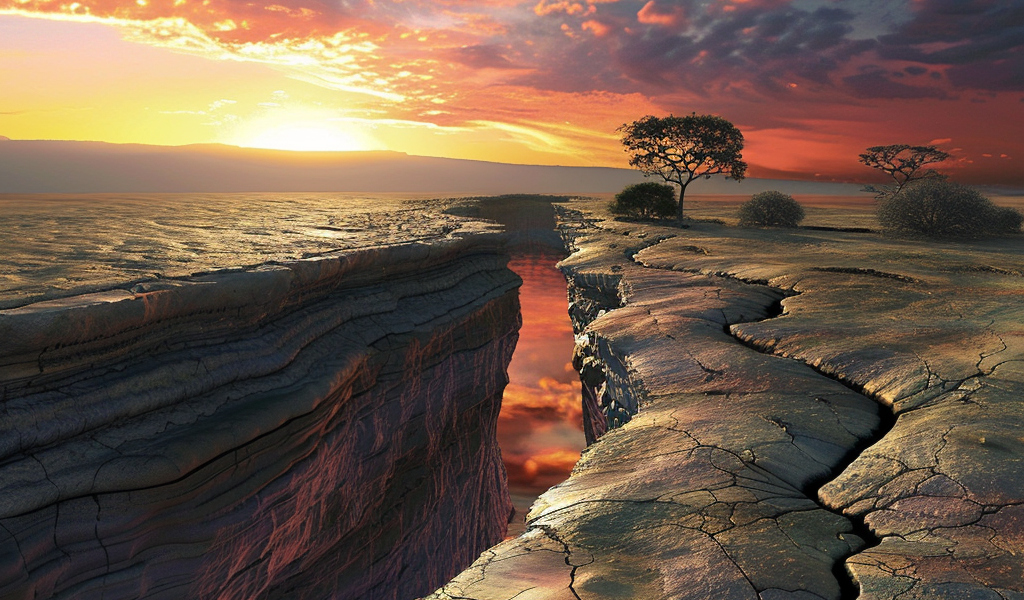In a remarkable geological development, scientists have recently uncovered the formation of what could be termed Earth’s sixth ocean. This extraordinary phenomenon is attributed to the gradual separation of tectonic plates, particularly in the African region, which may significantly impact global geography.
The Earth’s crust is in a constant state of flux, with tectonic plates shifting over millions of years. Recent observations indicate that two segments of the African continent are slowly drifting apart, creating the conditions necessary for a new ocean to form between them.
This geological process involves the interaction of three major tectonic plates:
- The African Plate
- The Arabian Plate
- The Somali Plate
For approximately 30 million years, the Arabian plate has been gradually moving away from the African continent. At the same time, the Somali plate is also separating from the African plate, resulting in the creation of a rift across the East African Plate. This intricate interplay of geological forces is driving the emergence of the new ocean.
The implications of this tectonic activity are profound. Should the current trend persist, we could witness a significant transformation of the African landscape. Countries that are currently landlocked, such as Zambia and Uganda, might eventually acquire coastlines, which would fundamentally change their geographic and economic prospects.
Recent advancements in technology have played a crucial role in unveiling the hidden geological changes occurring beneath our feet. While many of these changes happen at a pace that is imperceptible to the naked eye, modern technology has equipped scientists with the tools necessary to monitor these movements with remarkable precision.
Global Positioning System (GPS) instruments have revolutionized the field of geophysics, allowing researchers to measure tectonic plate movements with unprecedented accuracy. Ken Macdonald, a marine geophysicist and professor at the University of California, elaborates on this technological advancement: “With GPS measurements, you can measure rates of movement down to a few millimetres per year. As we get more and more measurements from GPS, we can get a much greater sense of what’s going on.”
This leap in technology has provided scientists with invaluable insights into the geological processes that shape our planet. It has enabled them to confirm the gradual separation of the African continent and predict the eventual formation of a new ocean.
The ability to track these minute movements holds significant implications for our understanding of Earth’s dynamics. It empowers researchers to study not only the formation of new oceans but also other geological phenomena, including volcanic activity and magma movements, with greater precision.
As scientists continue to investigate the ongoing geological changes, the potential for new discoveries remains high. The formation of a new ocean is not just a fascinating scientific phenomenon; it also poses questions about the future of the African continent and its people.
Geologists are particularly interested in how this tectonic activity may affect the region’s ecosystems and biodiversity. The creation of a new ocean could lead to new marine habitats, influencing the flora and fauna of the area. Additionally, the economic ramifications could be substantial, as access to new marine resources could alter trade dynamics and stimulate growth in previously landlocked nations.
Moreover, the geological changes occurring in East Africa may serve as a precursor to similar events in other parts of the world. Understanding the mechanisms behind the formation of this new ocean could provide insights into tectonic activities globally, potentially informing predictions about future geological events.
As researchers delve deeper into the complexities of tectonic movements, the findings could reshape our understanding of not only the African continent but also the Earth as a whole. The unfolding of this geological phenomenon serves as a reminder of the dynamic nature of our planet and the intricate processes that govern its evolution.
In summary, the formation of Earth’s sixth ocean is a captivating subject of study that highlights the power of modern technology in uncovering the Earth’s hidden changes. With continued research and exploration, scientists are poised to learn more about this fascinating geological event and its far-reaching implications for the future.





